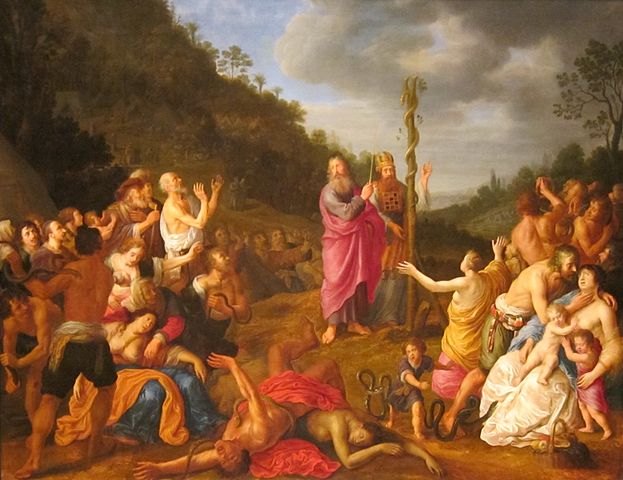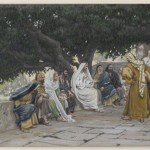
Moses and the Brazen Serpent (1640), by Adriaen van Nieulandt (c. 1586-1658) [public domain / Wikimedia Commons]
***
(4-9-06)
***
Is it true that in Old Testament times, the people were basically on their own vis-a-vis biblical interpretation, and application of the Mosaic Law. No! Theirs was not a sola Scriptura system. I offer examples below.
*****
1) Moses didn’t just give the Law to the Hebrews; he also taught it:
Exodus 18:15-20 (RSV) And Moses said to his father-in-law, “Because the people come to me to inquire of God; when they have a dispute, they come to me and I decide between a man and his neighbor, and I make them know the statutes of God and his decisions.” Moses’ father-in-law said to him, “What you are doing is not good. You and the people with you will wear yourselves out, for the thing is too heavy for you; you are not able to perform it alone. Listen now to my voice; I will give you counsel, and God be with you! You shall represent the people before God, and bring their cases to God; and you shall teach them the statutes and the decisions, and make them know the way in which they must walk and what they must do.”
2) Aaron, Moses’ brother, is also commanded by God to teach:
Leviticus 10:10-11 You are to distinguish between the holy and the common, and between the unclean and the clean; and you are to teach the people of Israel all the statutes which the LORD has spoken to them by Moses.
3) Levite priests were to teach Israel the ordinances and law:
A) Deuteronomy 33:10 They shall teach Jacob thy ordinances, and Israel thy law; they shall put incense before thee, and whole burnt offering upon thy altar. (see 33:8)
B) 2 Chronicles 15:3 For a long time Israel was without the true God, and without a teaching priest, and without law; [which was, of course, not the normative situation]
C) Malachi 2:4-8 So shall you know that I have sent this command to you, that my covenant with Levi may hold, says the LORD of hosts. My covenant with him was a covenant of life and peace, and I gave them to him, that he might fear; and he feared me, he stood in awe of my name. True instruction was in his mouth, and no wrong was found on his lips. He walked with me in peace and uprightness, and he turned many from iniquity. For the lips of a priest should guard knowledge, and men should seek instruction from his mouth, for he is the messenger of the LORD of hosts. But you have turned aside from the way; you have caused many to stumble by your instruction; you have corrupted the covenant of Levi, says the LORD of hosts,
4) Ezra read the Law of Moses to the people in Jerusalem (Ezra 8:3). In 8:7-8 we find 13 Levites who assisted Ezra, helped the people to “understand the law” and who “gave the sense.” Much earlier, in King Jehoshaphat’s reign, we find Levites exercising the same function (2 Chronicles 17:8-9). So the people did indeed understand the law (8:12), but not without much assistance – not merely upon hearing:
Nehemiah 8:1-9: 1: And all the people gathered as one man into the square before the Water Gate; and they told Ezra the scribe to bring the book of the law of Moses which the LORD had given to Israel.
2: And Ezra the priest brought the law before the assembly, both men and women and all who could hear with understanding, on the first day of the seventh month.
3: And he read from it facing the square before the Water Gate from early morning until midday, in the presence of the men and the women and those who could understand; and the ears of all the people were attentive to the book of the law.
4: And Ezra the scribe stood on a wooden pulpit which they had made for the purpose; and beside him stood Mattithiah, Shema, Anaiah, Uriah, Hilkiah, and Ma-aseiah on his right hand; and Pedaiah, Misha-el, Malchijah, Hashum, Hash-baddanah, Zechariah, and Meshullam on his left hand.
5: And Ezra opened the book in the sight of all the people, for he was above all the people; and when he opened it all the people stood.
6: And Ezra blessed the LORD, the great God; and all the people answered, “Amen, Amen,” lifting up their hands; and they bowed their heads and worshiped the LORD with their faces to the ground.
7: Also Jeshua, Bani, Sherebiah, Jamin, Akkub, Shabbethai, Hodiah, Ma-aseiah, Kelita, Azariah, Jozabad, Hanan, Pelaiah, the Levites, helped the people to understand the law, while the people remained in their places.
8: And they read from the book, from the law of God, clearly; and they gave the sense, so that the people understood the reading.
9: And Nehemiah, who was the governor, and Ezra the priest and scribe, and the Levites who taught the people said to all the people, “This day is holy to the LORD your God; do not mourn or weep.” For all the people wept when they heard the words of the law.
Now, is this “infallibility”? No, we must admit that it doesn’t say that; yet it is very strong. This is authoritative teaching from the “Old Testament Church,” so to speak. Moses doesn’t just give a nice, wistful, pleasant sermons to ponder over a steak lunch. He says that “I make them know the statutes of God and his decisions.” Of the Levites it is said: “For the lips of a priest should guard knowledge, and men should seek instruction from his mouth, for he is the messenger of the LORD of hosts.” Ezra and his teaching assistants “gave the sense, so that the people understood the reading.” This is authoritative teaching! Yet when the Catholic Church merely claims the same prerogative, somehow it is objectionable and some supposedly radical and new thing. It’s exactly what was already happening before.
The New Testament continues the same notions of guided understanding of the Scriptures. The Ethiopian eunuch says, “How can I [understand the Scripture], unless some one guides me?” Other passages concur:
2 Peter 1:20 First of all, you must understand this, that no prophecy of scripture is a matter of one’s own interpretation.
2 Peter 3:15-17 . . . So also our beloved brother Paul wrote to you according to the wisdom given him, speaking of this as he does in all his letters. There are some things in them hard to understand, which the ignorant and unstable twist to their own destruction, as they do the other scriptures. You therefore, beloved, knowing this beforehand, beware lest you be carried away with the error of lawless men and lose your own stability.
Jesus Himself even upholds the teaching authority of the Pharisees, of all people, and based on a Jewish tradition, not found in the Old Testament at all:
Matthew 23:1-3 Then said Jesus to the crowds and to his disciples, “The scribes and the Pharisees sit on Moses’ seat; so practice and observe whatever they tell you, but not what they do; for they preach, but do not practice.”
We see, then, that the Bible (both Old Testament and New Testament) teaches a notion of authority precisely like what we find in the Catholic Church: the three-legged stool of Scripture + Church + Tradition. It does not teach sola Scriptura. But Martin Luther started teaching something very different from this:
But, that there are in the Scriptures some things abstruse, and that all things are not quite plain, is a report spread abroad by the impious Sophists; by whose mouth you speak here, Erasmus . . .
This indeed I confess, that there are many places in the Scriptures obscure and abstruse; not from the majesty of the things, but from our ignorance of certain terms and grammatical particulars; but which do not prevent a knowledge of all the things in the Scriptures . . .
All the things, therefore, contained in the Scriptures, are made manifest, although some places, from the words not being understood, are yet obscure . . . And, if the words are obscure in one place, yet they are clear in another . . . For Christ has opened our understanding to understand the Scriptures . . .
Therefore come forward, you and all the Sophists together, and produce any one mystery which is still abstruse in the Scriptures. But, if many things still remain abstruse to many, this does not arise from obscurity in the Scriptures, but from their own blindness or want of understanding, who do not go the way to see the all-perfect clearness of the truth . . . Let, therefore, wretched men cease to impute, with blasphemous perverseness, the darkness and obscurity of their own heart to the all-clear scriptures of God . . .
If you speak of the internal clearness, no man sees one iota in the Scriptures, but he that hath the Spirit of God . . . If you speak of the external clearness, nothing whatever is left obscure or ambiguous; but all things that are in the Scriptures, are by the Word brought forth into the clearest light, and proclaimed to the whole world.
(The Bondage of the Will, from translation by Henry Cole, Grand Rapids, Michigan: Baker Book House, 1976, 25-27, 29)
Bishop “Dr.” (?) James White tried to do a similar thing in his argument that I responded to in my book, The Catholic Verses ( p. 51). Here is that excerpt:
White, however, writes:
“And who can forget the result of Josiah’s discovery of the Book of the Covenant in 2 Chronicles 34?”
(White, 101)
Indeed, this was a momentous occasion. But if the implication is that the Law was self-evident simply upon being read, per sola Scriptura, this is untrue to the Old Testament, for, again, we are informed in the same book that priests and Levites “taught in Judah, having the book of the law of the LORD with them; they went about through all the cities of Judah and taught among the people” (2 Chron. 17:9), and that the Levites “taught all Israel” (2 Chron. 35:3). They didn’t just read, they taught, and that involved interpretation. And the people had no right of private judgment, to dissent from what was taught.
Anyone can “win” an argument if they simply assume its conclusion and ignore all counter-evidences in the very Scripture which the argument purports to be self-evident in the main upon reading (i.e., without necessary need of an authoritative Church or interpreter to resolve various disputes on doctrine which incessantly plague Protestants because they have adopted this false, unbiblical principle).
The choice is presented by many Protestant apologists as “Law of Moses / Torah / Bible” vs. “tradition” (in this case, a false tradition of men). It’s presupposed for the purpose of this argument that all “tradition” is bad. But of course, this is not the New Testament position, which is that there can be such a thing as a good, apostolic, true tradition (many statements from Paul, as well as Jesus), as well as a corrupt (mere) tradition of men.
So if we re-approach the question above, the answer is that the Torah combined with true oral tradition (which all Jews believed to have also been given to Moses at Mt. Sinai) gives one the truth. When Josiah rediscovered the Law, the true teaching was restored. But this doesn’t prove that all tradition or authoritative teaching is therefore eliminated, simply because there had been a false tradition of worship that Josiah reformed.
Doctrinal development in the Bible, between the testaments, is consistent: there was strong authority and tradition in the Old Testament and there continues to be in the New Testament. Both teach the “three-legged stool” notion of authority: not sola Scriptura. Mainstream Judaism accepted oral tradition right alongside the Torah and the rest of the Old Testament. It was only the liberal Sadducees who denied that (they also denied the afterlife). They were the liberals of the time, and also the sola Scripturists (just as the later heresies like Arians believed in Bible Alone because the apostolic tradition refuted them and they couldn’t appeal to it). But the Sadducees are never called Christians in the New Testament, whereas Pharisees are (indeed, Paul calls himself one, and Jesus said to follow their teaching, despite their hypocrisy of action).
Both the Old Testament and New Testament (within consistent development) conform far more closely to the Catholic model than any Protestant variant.













